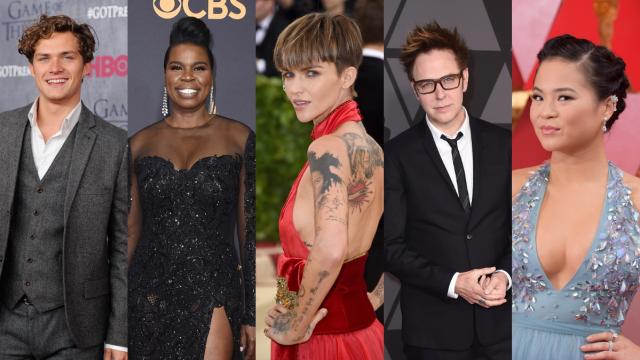The CW’s new Batwoman, Ruby Rose, is the latest high-profile actor to quit social media after facing harassment from so-called fans over her role in a nerdy project. It’s becoming more common for actors and creators to leave social media platforms because of online abuse, enough that it’s starting to feel like an everyday annoyance we can ignore. It’s not. And we shouldn’t.
Rose deleted her Twitter account and deactivated comments on her Instagram following days of direct attacks after her recently announced role as DC Comics character Kate Kane (aka Batwoman) in the CW’s Arrowverse crossover and potential spinoff series. We’ve seen plenty of awful comments online over CW choosing to introduce an LGBTQ+ superhero as its latest protagonist, but Rose specifically quit because of a different kind of harassment—from people telling her she’s not gay enough.
In a series of now-deleted tweets (as shared by the Hollywood Reporter), Rose criticised people who suggested she wasn’t a lesbian so she shouldn’t be allowed to play one:
Where on earth did ‘Ruby is not a lesbian therefore she can’t be batwoman’ come from — has to be the funniest most ridiculous thing I’ve ever read. I came out at 12? And have for the past 5 years had to deal with ‘she’s too gay’ how do y’all flip it like that? I didn’t change. I wish we would all support each other and our journeys.
When women and when minorities join forces we are unstoppable… when we tear each other down it’s much more hurtful than from any group. But hey/ love a challenge I just wish women and the LGBT community supported each other more, My wish was we were all a little kinder and more supportive of each other…Sending everyone my love and gratitude, it’s been a rollercoaster of a year, this month especially.
I am looking forward to getting more than 4 hours of sleep and to break from Twitter to focus all my energy on my next 2 projects. If you need me, I’ll be on my Bat Phone.
We often think that online harassment of celebrities in nerd culture is limited to alt-right trolls and man-babies who bully women, people of colour, and those in the LGBTQ+ community for daring to exist in what they consider “their” space. And yes, that’s a major part of it.
It’s what happened to Star Wars’ Kelly Marie Tran and Daisy Ridley, as well as Ghostbusters’ Leslie Jones. Guardians of the Galaxy director James Gunn was fired by Disney and deleted his Twitter archive after a recent conservative-led attack against him. In 2016, Nintendo fired product marketing specialist Alison Rapp after a months-long harassment campaign from a largely male group who blamed her for “politically correct” changes to Nintendo’s games. And then we’ve got Comicsgate, Gamergate, or any other “gate” that results in online abuse of diverse creators.
Outside of the typical alt-right noise, we’ve seen Stranger Things’ Millie Bobby Brown quit social media after being the target of a trolling campaign that started when someone made up a claim that she’d ripped off a woman’s hijab. It wasn’t true and they knew it, but that didn’t stop people from attacking the young actress relentlessly for it. Then there’s abuse from people from marginalized groups directly harassing actors, artists, and creators for not meeting their standards. This can be related to legitimate discussions of representation, like the casting of Netflix’s Iron Fist. Or, in the case of Rose, the other issue is that she’s playing a Jewish character (though the CW hasn’t even mentioned that part of Batwoman’s characterization as of yet) when the actress herself is not Jewish. This does warrant a discussion, but we have to think about where discussions like that should be directed, how it’s happening, and what the end goal actually is.
It’s something that often gets lost in these discussions—because social media has blurred the lines between how we feel and communicate—that there is a difference between criticism and discourse, and harassment. Discourse is examining issues in nerd culture, examining the problems themselves and how they should be addressed. Do individual people play into the discourse? Absolutely. For example, Iron Fist actor Finn Jones (who himself left Twitter) had some pretty awful responses to criticism about him taking on the role of Danny Rand (a character many hoped would be cast differently from the comic’s historically white depiction), adding himself to the discussion. But examining the topic at hand and then posting those thoughts online isn’t in the same league as directly engaging another human being online with abusive language.
Legitimate concerns of representation do not justify harassment. I’m sick of hearing the excuse that all of it is part of the same thing, and that if you want to be on social media it’s part of the devil’s bargain. It’s not. Attempting to engage in discussions of representation is one thing, lashing out with violent or abusive words is another. And what’s worse, for every high-profile celebrity who’s left Twitter or Instagram because of harassment, there are several regular users who disappear from social media because they too are facing online abuse—often without the same social net to support them after they’re gone.
Outside of social media platforms like Twitter getting its act together and effectively enforcing their anti-harassment policies—or individuals taking personal responsibility and choosing to act better—there’s sadly no easy fix. I don’t have a solution. I just have frustration, anger, and exhaustion. In a previous article on this topic, we suggested people in positions of power speak out and work harder to support their actors and creators against harassment, which is an admirable goal. As of now, it’s happening more on a case-by-case basis, instead of systemic policy, which makes it harder to curb this ever-growing trend of having no option but to quit existing online for good. And it’s fucked up that we’re becoming more and more ok with that being the consequence.
